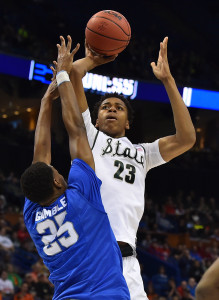OVERVIEW: Deyonta Davis did not post big numbers as a freshman at Michigan State. That failed to deter the 6’10” power forward from entering the draft after his lone college season. Davis, who was ranked No. 28 by the Recruiting Services Consensus Index out of high school, became a starter during the Big Ten portion of the Spartans’ schedule. He made his mark on the defensive end, averaging 1.9 blocks in 18.7 minutes while also finishing as the team’s third-leading rebounder at 5.5 per game. He wasn’t a big part of the offense, scoring at a 7.4-point clip, but the 19-year-old oozes potential because of his length and athleticism. Davis did not immediately declare for the draft but ultimately bolted when he was convinced he could be a lottery selection.
STRENGTHS: Davis can impact the game with his physical gifts. Davis displayed defensive versatility with his ability to switch on screens and keep a wide range of opponents in front of him, as DraftExpress’ Jonathan Givony notes. His ability to protect the rim with his 7’2” wingspan and snare rebounds in traffic helped the Spartans enter the NCAA Tournament as a No. 2 seed, despite Michigan State’s overall lack of physicality. ESPN Insider Chad Ford credits Davis for his shooting range out to 17 feet, though the Spartans didn’t run plays for him, and he got most of his points on put-backs and dunks. He shot 59.7% from the field because he didn’t try to do too much or take questionable shots. He’s also considered a hard worker and high-character player who blends well with his teammates.
WEAKNESSES: Most draft experts felt Davis should have stayed in school another year to develop his game. As Ford described in his draft analysis, Davis is a “pure upside play” because he’s so raw offensively. While he displayed a nice shooting touch on his short and midrange jumpers, Davis is by no means a stretch four. He did not even attempt a 3-pointer, so he’ll need to work extensively on his post moves to become a significant offensive threat. Like most young frontcourt players, Davis also has to become much stronger. He could get overpowered in one-in-one matchups early in his career until he fills out and gets accustomed to the banging. His college coach, Hall of Famer Tom Izzo, wished he had another season to work with Davis. “Would a second year have helped him? No question,” he said in a radio interview with WQTX-FM that was quoted by the Lansing State Journal’s Chris Solari. “We didn’t think we might have him for more than two years when it all started. So it wasn’t like we were thinking of this as a four-year deal, either. “
(For Part Two of our Deyonta Davis Prospect Profile, click here.)
